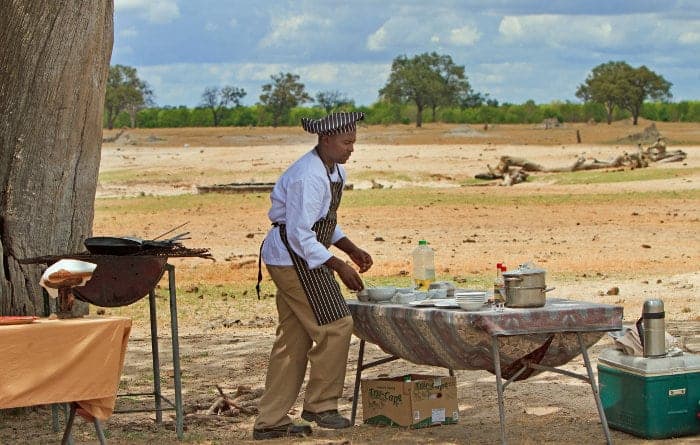
The people you spend most time with are those that help create your safari experience, particularly the guides. In almost all destinations, the people involved with your safari originate from the local area, adding their own local flavour to your experience.
And while some may seem shy at first, there’s an opportunity to share stories with all these people on your safari.
Guides
![]()
Safari guides are the best guides in the world. Think about it. A city guide takes visitors on the same journey every day, narrating the same stories about the same places.
A safari guide takes visitors into the wild. They must choose a route that delivers both a profusion and diversity of animals.
They must react to their surroundings, knowing when to follow a cheetah for a few minutes longer and when to leave two fighting elephants because the scene is getting dangerous.

On a city tour the same sights come in the same order, every day. With a safari there’s no knowing what will happen, so the guide must be able to think quickly and adjust the rest of the day to what has just occurred.
Guides have a huge impact on your experience, notably because they know where to find the most impressive safari scenes, such as predators on a hunt or large herds congregating.

While the general standard of guiding is good across Africa, there’s a clear difference between budget operators and more established safari businesses. Better guides cost more, just like any other profession.
The cheapest tour operators pay the least, so their guides are unlikely to have many years of experience. High-end lodges and camps pay much more, usually employing guides with decades of experience.
Drivers

It’s one thing being the tour guide, searching for wildlife and narrating information while keeping the group happy. Imagine doing that and having to drive as well, negotiating rugged four-wheel drive trails with elephants all around!
Almost all mid to high-end safari operations will have a guide and a driver. The driver focuses on driving and the guide is just the guide.
However, budget operations in East Africa may have one person filling both roles: you get what you pay for on a safari like this.
Camp and Lodge Staff

On a typical safari day you’ll be looked after by the guide whenever you go out on an activity. Back at the camp the guides get to rest and other staff take over, keeping you entertained and comfortable in often wild surroundings.
Just like the guides and drivers, these people also have their own tribe and own stories, so it’s well worth saying hello and making conversation.
You don’t need to visit a village to meet local people, you can chat with those at the camp, including chefs and warrior guards keeping wild animals away.
Rangers

Every park and reserve has its own game rangers, dedicated specialists who help protect the ecosystem and manage the balance between people and animals. It’s a tough job on a huge landscape.
What if lions wander into a populated area outside the national park?
What happens when a driver illegally goes off trail?
What gets done when too many safari vehicles scare a cheetah off its kill?
That’s all the job of the rangers.
You will meet them briefly at checkpoints around the park, or perhaps at the camp if certain animals have been getting too close.
In some places armed rangers will accompany you on walking safaris, providing an additional layer of safety.